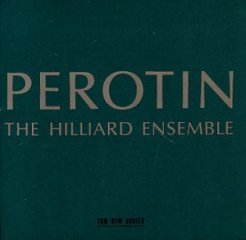Perotin - The Hilliard Ensemble (1986)
Perotin - The Hilliard Ensemble (1986)

1.Viderunt Omnes 11:36 2.Veni Creator Spiritus 7:29 3.Alleluia Posui Adiutorium 7:34 4.O Maria Virginei 4:49 5.Dum Sigillum 7:37 6.Isaias Cecinit 1:43 7.Alleluia Nativitas 8:31 8.Beata Viscera 6:12 9.Sederunt Principes 11:54 Hilliard Ensemble: Rogers Covey-Crump - Tenor Charles Daniels - Tenor Paul Hillier – Baritone, Director David James - Counselling, Counter Tenor Gordon Jones - Baritone Mark Padmore - Haute Contre, Tenor John Potter - Tenor
It would be impossible to adequately describe the inherent haunting beauty of Perotin's music, or to fully detail its far-reaching influence in latter-12th-century France. The opening "Viderunt omnes" is a perfect illustration of the surprising vitality and highly charged sense of forward motion that can be obtained with relatively simple rhythmic impulses and harmonic devices. The male voices of the Hilliard Ensemble generate an electrifying resonance that vibrates everything in the room that's not solid or nailed down. You can literally feel this music, ringing with natural harmonics and set to body-moving rhythms. Yes, it's religious music, intended for lofty cathedral spaces; but it moves, and it's moving, and this recording gives it to you full blast. ---David Vernier, amazon.com
Perotin (or Magister Perotinus) was at the forefront of polyphony as it emerged in the twelfth century, together with Leonin (Magister Leoninus). Paul Hillier's scholarly sleeve notes describe the processes at work in his music far better than a short review could; suffice it to say that the style of some of the organum pieces has influenced many a twentieth century composer, including the minimalist Steve Reich, whose views are quoted in the notes. Perotin is not the only composer represented in the programme - some of the pieces are anonymous, although this does not detract from their musical strength in any way.
In a nutshell, the organum works are founded on plainchant, which is sung as part of the performance. Some voices sing the chant in extremely long note values, so that the progressions of the melody are hard to distinguish. Meanwhile, higher voices dance through a series of rhythmically-charged motifs, overlapping with each other and producing an astonishing alternation of dissonances and consonances, breathtaking to hear. The opening piece, the Christmas motet "Viderunt omnes," is a particularly fine example of this.
Other works in the programme sound closer to the sound world of Guillaume de Machaut: "Dum signillium" and "Veni Creator spiritus" are two such pieces, the former sung by tenors John Potter and Rogers Covey-Crump whilst the latter adds counter-tenor David James. Another short motet, "Isaias cecinit," repeats the same material for new verses of text, like a hymn tune with a descant at the end. ---Mark Swinton, amazon.com
download: uploaded anonfiles yandex 4shared solidfiles mediafire mega filecloudio








